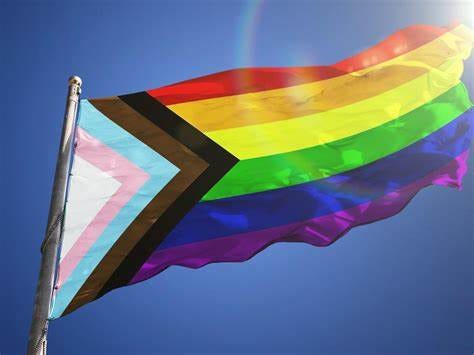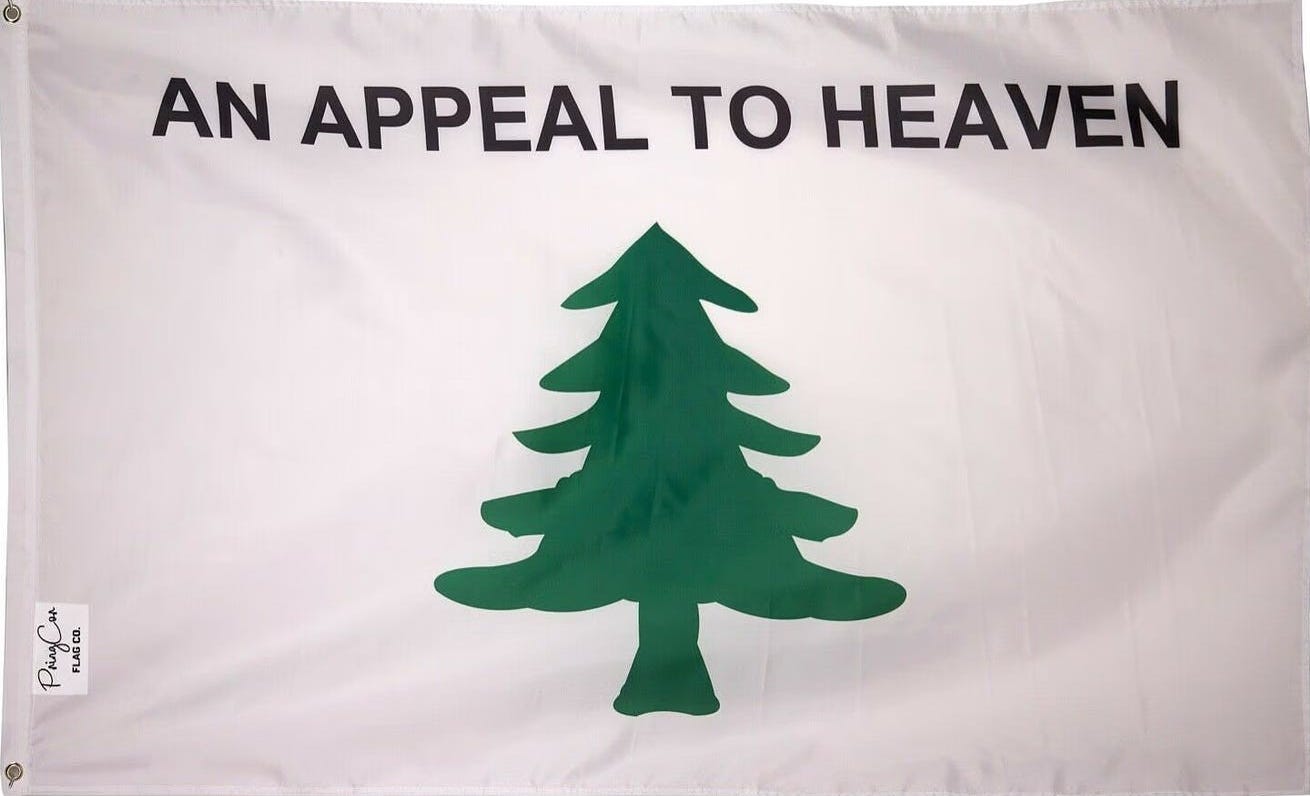Flags have been on my mind these last few weeks. It started with the media’s contrived handwringing over Mrs. Alito’s flags. And since it’s now June, I’ve had the Pride flag up in my face more than usual.
If you’re unfamiliar with the Alito flag story, you can read about it here and here. I almost yawned my way through the hubbub over the Appeal to Heaven flag at the Alito vacation home, except that while the media and others were busy demanding Justice Alito recuse himself, the truth of why they hate that flag became apparent. And the reason is simply this: They can’t stand the words Appeal to Heaven. The linked articles above both quote “experts” on why these words are so problematic in our public discourse. It’s the usual stern warnings and hysterical hand waving about the danger of linking one’s cause to God. Because you know, every time someone invokes God in politics, it’s automatically the bogeyman of Christian Nationalism.
If we follow the argument these experts are making to its logical end, what we end up with is a justification for keeping Christianity out of the public square. Maybe they’ll allow us in, but only on the condition that we mute our Christianity. They will brook no witness to Christ, nor any appeal to heaven, despite the fact that Christians are a large part of the body politic and have been from our founding to the present day.
There’s a connection between the left’s treatment of the Appeal to Heaven flag, and their aggressive promotion of the Pride flag. With the former, they’ve attempted to take a beautiful, historic flag, and make it toxic, while simultaneously taking the latter, a truly toxic flag, and making it more palatable by papering over its ugly meaning. The goal of both of these efforts is to diminish witnessing to the truth, and to intimidate Christians out of the public square.
In an excellent speech on Christian witness, Peter Kreeft, renowned philosopher and author of over 80 books, noted the ways in which the purveyors of LGBTQ ideology attempt to block Christian witness, and how it begins with their shrill insistence that we all go along with the deceptive meaning they’ve given their own flag. Kreeft has a simple formulation on how to witness to the truth: see the truth, say the truth, and suffer for saying it. Kreeft leans heavily on the most important question that must be asked in order to learn the truth about something, “What is it?” Without a truthful answer to this question, we can’t possibly know what we’re even talking about.
As to the “What is it?” question of the Pride flag, Kreeft notes how the activists have successfully cowed many people into silence; that is, people might see the truth of the thing, but they won’t say the truth, because to do so will mean suffering—such as job loss or being ostracized socially. And so, they ignore this most basic question, “What is it?” thereby obscuring the truth even from themselves. As Kreeft says, “The simple question of what sodomy and homosexual activity actually and literally is, is not only never answered, it’s never asked.” Which is exactly the way the LGBTQ lobby wants it, because it makes their propaganda so much easier.
In my vocation as a Mom, I’ve run headlong into this tension Kreeft identifies between the stark reality of what the Pride flag actually symbolizes, versus the euphemistic love and acceptance language on which the LGBTQ adherents insist. But the propaganda begs the question: love and acceptance of what? And that brings us full circle back to Kreeft and the necessity of answering the question, “What is it?” As parents, we have to find a way to truthfully answer this for our children, while still protecting their innocence.
For me this moment came last June, as I was out running errands with my youngest daughter in tow. Even though I’ve long avoided the usual suspects (I’m looking at you, Target), we still managed to see half a dozen Pride flags that morning. And my precocious daughter started saying things like:
“Why does everyone have that flag?” “Look Mom, there it is again!” “Why do people like it? I don’t think it’s very pretty.” Now I admit, in response to my child’s observations, I did what many of us do when we’re in a hurry, and don’t feel like tackling difficult subjects:
I deflected.
Oh, don’t worry about it. It’s nothing to pay attention to. Now what should we have for lunch when we get home?
But I knew that I was going to have to do better than that, because if there’s one thing the LGBTQ activists and I agree on, it’s this: the power of the first impression on a child. Once an idea takes hold in the mind of a child, it is an uphill battle to undo it. For the rainbow brigade, their flag is only the initial, visual intrusion into childhood innocence. They normalize their symbol first, and then gradually proceed in other ways to erode the child’s inborn “wisdom of repugnance,” to use a phrase coined by scientist and author Leon Kass.
My daughter had essentially posed Peter Kreeft’s “What is it?” question, and I had a duty give a truthful answer. But I could not tell her the explicit truth of the thing because I’m also charged with protecting her innocence. She has no idea what sex is, what gay is, and nor should she. I’m convinced that the proponents of LGBTQ know they’ve put parents in an impossible position, and they use this to their advantage. Because if parents hesitate to articulate the truth of what that flag actually symbolizes—sexual degradation, self-worship, sin—then they’ve left the discussion space wide open, and it’s only a matter of time before the activists move in.
As we headed home, something I would call providential happened. We saw an ambulance. We are in the habit, as are many Christians, of praying for whomever is in an emergency.
Oh, look kids! An ambulance. Someone’s in trouble. Let’s pray for that person.
After my daughter and I prayed the Our Father, we had the following exchange (to the best of my recollection). My responses are in italics:
“You know,” I said, “The next time we see that flag, I think we should say a prayer.”
“Why?” she asked, “Is someone in trouble?”
“They most certainly are.”
“What happened to them?” she asked.
“They turned away from God’s mercy.”
“Why did they do that?”
“Because they decided they are proud of their sins, instead of being sorry.”
“What sin did they do?”
“That part I can’t tell you until you’re older. But whenever you see that flag, God is being offended.”
“Well, I’m friends with God,” was her reply.
“Indeed, you are.”
The habit of praying when we see the Pride flag caught on in my household, from the youngest one on up. We are Catholic, so we’ve decided to say a Hail Mary. Now we all have a ready response. We don’t ignore it. I don’t deflect. We witness. We pray.
A few weeks ago, as we drove through town, my daughter suddenly pointed to a store we see every week. Until now, it had been festooned with a variety of Pride flags flying above its doors. I have no idea what they sold, I never went in. But now it was practically empty. We looked closely, and there was the sign:
Out of Business.
“I’ve been praying about that store for a year,” my daughter exclaimed.
While this is only a small anecdote, it was nonetheless a significant early lesson on giving witness to the faith, as well as to the necessity and efficacy of prayer in a hostile culture. Christian witness to the truth is one of the last remaining bulwarks against all evil, including the ideology of the LGBTQ movement. Those of us who are willing to see the truth, say the truth, and suffer for it, are a threat the pervasive lie that is Pride. That is why they suppress our symbols, most recently the Appeal to Heaven flag, while compelling obeisance to their own.
With all that in mind, I pray for the protection of my children’s innocence; for my country to be delivered from the thrall of Pride; for the courage to witness to the truth publicly; and for God’s mercy and grace on all of us.
That is my Appeal unto Heaven.







The store selling the awful flags was shut down through your daughters prayers. What a wonderful way to deflect this evil! This is a wonderful way to deal with this that I will take to heart when the situation arises with my own children. Ave Maria!
“Well, I’m friends with God”. The innocence of children is beautiful.
Matthew 18:6